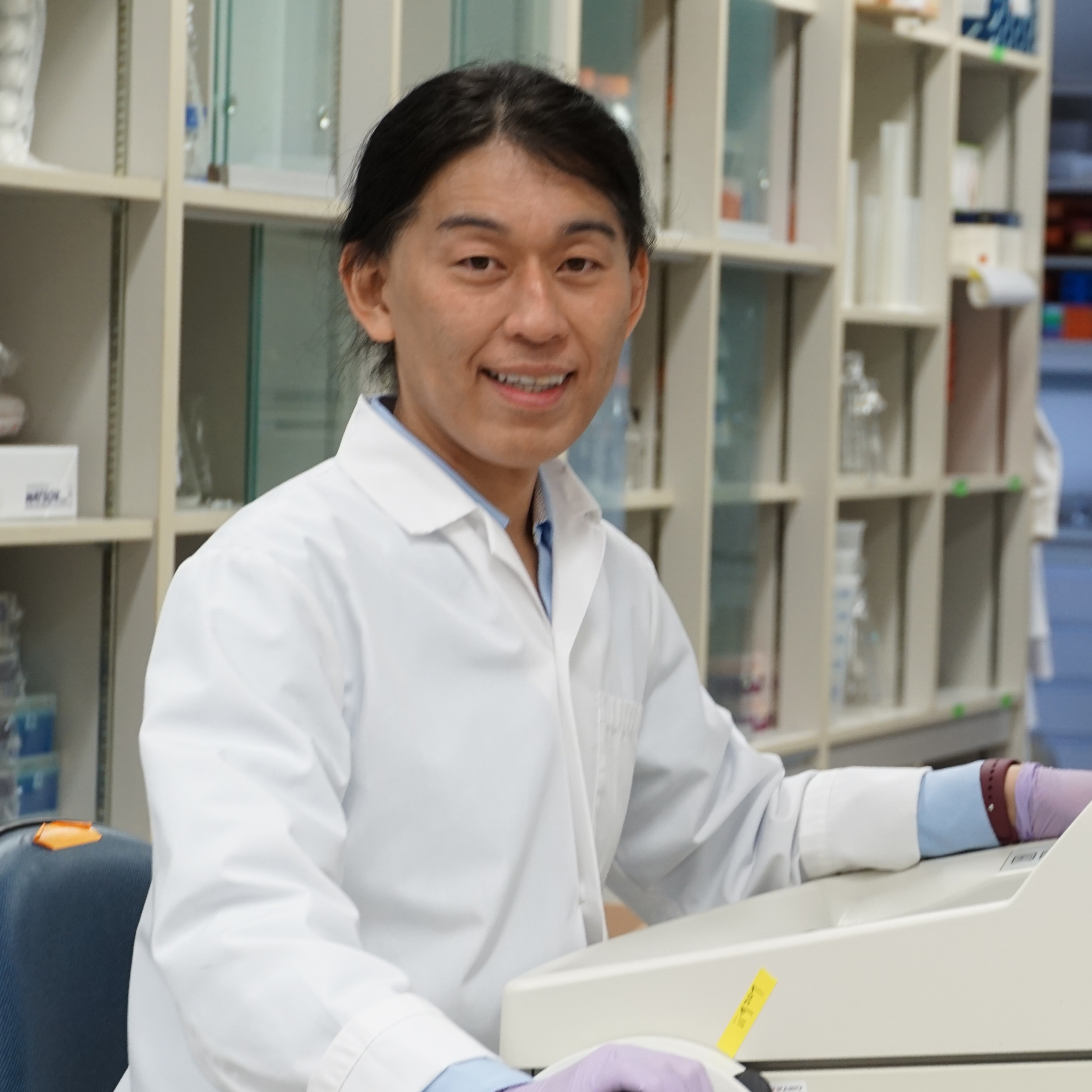Toshifumi Yokota

Professor
8-29A Medical Sciences BuildingOffice: 780.492.1102
Email: toshifum@ualberta.ca
Yokota Lab Website
Dr. Toshifumi (Toshi) Yokota is a Professor of Medical Genetics at the University of Alberta, holding the title of the Friends of Garrett Cumming Research & Muscular Dystrophy Canada Endowed Research Chair since 2011.
Dr. Yokota obtained a PhD degree from the University of Tokyo and moved to Imperial College London for postdoctoral training. Dr. Yokota's study demonstrated for the first time that appropriately designed antisense oligonucleotides can restore gene function and improve muscle strength in a severe animal model of Duchenne muscular dystrophy (DMD) by modulating splicing of gene transcripts called mRNA. This study directly led to a collaboration with a Japanese pharmaceutical company Nippon Shinyaku and the development of viltolarsen, an antisense oligonucleotide drug to treat DMD, which was approved by the FDA in 2020 after clinical trials conducted in several countries, including Canada and Japan. Viltolarsen is the first and only FDA-approved drug that clearly restored dystrophin, a muscle-supporting protein, and improved muscle function in clinical trials.
More recently, Dr. Yokota's research team designed and tested synthetic DNA-like molecules called gapmers that interfere with the production of a toxic protein that destroys the muscles in facioscapulohumeral muscular dystrophy (FSHD), the third most common form of muscular dystrophy. They demonstrated that the treatment knocked down more than 99 percent of the toxic gene products called DUX4 in patient-derived cells accompanied by morphological and functional improvement. Dr. Yokota's research goal is to improve the life of people living with devastating genetic disorders using state-of-the-art technologies, having published more than 100 papers, edited 2 books, and served as a board member for numerous journals and organizations.
Dr. Yokota’s research group focuses on understanding and developing treatments for muscular dystrophies and other genetic disorders. The group's research goal is to improve the life of people living with devastating genetic disorders using state-of-the-art technologies including genome editing and synthetic DNA-like molecules called antisense oligonucleotides. Dr. Yokota demonstrated for the first time that synthetic antisense oligonucleotides can restore gene function and improved muscle strength in a severe animal model of Duchenne muscular dystrophy (DMD) using a technique called exon skipping. Exon skipping is a precision medicine technique by which one or more of the protein-coding parts of the gene called exons is 'skipped' to mitigate the effect of mutations. This study directly led to a collaboration with a pharmaceutical company and the development of viltolarsen, an antisense oligonucleotide drug to treat DMD, which was approved by the FDA in 2020 (see: here). Viltolarsen is the first and only FDA-approved drug that clearly restored dystrophin, a protein lacking in DMD patients, and improved muscle function in clinical trials.
For more information, please visit the website.
Complete List of Published Work in My Bibliography
The laboratory of Dr. Yokota invites applications for postdoc, undergraduate and graduate student positions. By utilizing experimental and computational approaches, including antisense oligonucleotides, CRISPR/Cas9, and machine-learning, the focuses of the group are to develop novel molecular therapies for neuromuscular and musculoskeletal diseases. These new methods are applied to the correction of genetic mutations, new disease models, drug discovery, and addressing fundamental biological questions. The group is actively collaborating with the world-class researchers and industry partners. The highly interdisciplinary and collaborative environment provides unique career development opportunities for trainees. Their laboratory is renowned internationally for its work on the development of genome-editing/antisense technology. Full-time graduate students receive a stipend guaranteed to be equal to or greater than the minimum, determined yearly by the graduate committee. Priority will be given to those who want to further pursue PhD degree.
Each trainee receives training in a variety of areas, acquiring a basic skill set they need to further their individual projects. These skills include in silico drug design, muscle cell culture (human and animal cells), animal models, muscle physiology (e.g. exercise studies, grip strength, and muscle force measurement), histology, confocal/two-photon laser microscopy, molecular analysis (e.g. RNA-seq, quantitative real-time reverse transcription PCR analysis, molecular cloning), protein biochemistry, and proteomics analysis. This will ensure successful academic research careers and/or other career paths in non-academic health-related fields. Past trainees have landed faculty positions in research universities (e.g. Nihon University, University of Vermont) and jobs in the life science industry (e.g. Eli Lilly, Chugai Pharmaceutical ).
Located in Edmonton, one of the sunniest cities in Canada, the Faculty has been internationally recognized as among the world’s top 50 medical schools and as one of Canada’s premier health-education institutions. The University is currently home to 39,000 students and 15,000 faculty and staff. All applicants should have good spoken and written communication skills in English. Interested applicants should send i) a cover letter briefly describing your previous experience and your future research interest/plan, ii) a curriculum vitae, and iii) contact information of at least three references to Dr. Toshifumi Yokota (toshifumi@ualberta.ca)
Rohini Roshmi - Lab Technician
Man Yong - Lab Technician
Tejal Aslesh - Graduate Studen
Saeed Anwar - Graduate Student
Ahad Shah - Graduate Student
Radha Maradiya - Undergraduate Student
Tom Sato-O'Hearn -Undergraduate Student
Satomi Shirakaki -Undergraduate Student
Farin Mir- Undergraduate Student
Zorica Nakevska - Undergraduate Student
Ammar Al-Aghbari - Undergraduate Student
Harry Wilton-Clarke - Undergraduate Medical Student
Joshua Lee - PhD 2018
Ashley Guncay - MSc 2016
Aleksander Touznik - MSc 2016